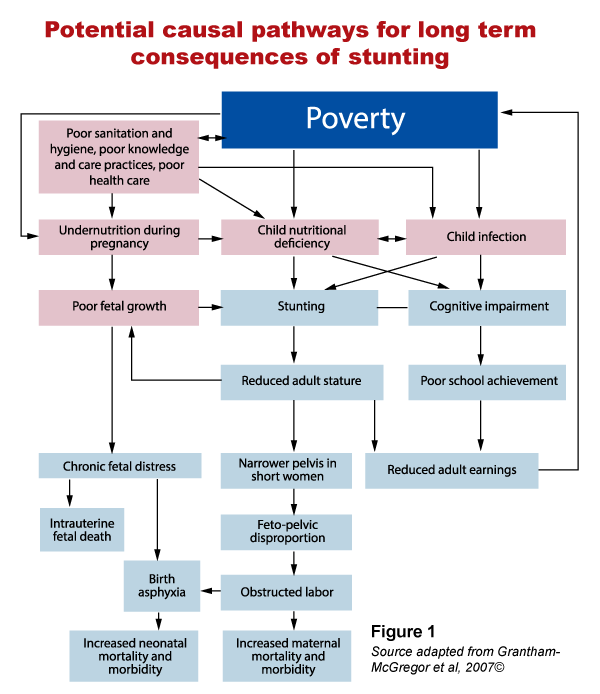Childhood stunting refers to the failure to reach the expected normal growth potential as a result of poor health and/or nutritional conditions. Stunting can cause major short- and long-term effects on children.
A significantly low height for age is a strong predictor of mortality in the first 5 years of life. Lack of adequate nutrients in the first 1,000 days (from conception) has also been known to have long-term outcomes, such as poor performance in school, reduced lean body mass, diminished intellectual functioning, decreased employment opportunities and reduced earnings.
Recent evidence also indicates that children born to women who are stunted are at greater risk of dying sooner than children of mothers with normal height.

There are 3 main factors that can lead a child to stunting:
1. Reduced Intake of Nutrients
A child may be deprived of nutrients because of poor feeding practices which limits the energy available for growth. Poverty is the underlying reason for childhood stunting and is the epicentre of a vicious cycle that may last in families for generations. However, childhood stunting does not exclusively target the poor as statistics show an increasing number of middle income families being affected as well.
Additionally, lack of nutrients also weakens the child’s immune system and can lead to recurrent infections (e.g. pneumonia, hepatitis, influenza) which exposes them to risk of cognitive impairment, stunting and other dire consequences (as shown in figure 1).
Other chronic conditions that adversely affect the heart, lung or liver can directly influence a child’s ability to eat normally. For example, a child with heart disease may experience rapid breathing. The catabolic state they are in causes them to use up a lot more calories as opposed to normal breathing. Therefore, they must consume more calories than usual to keep up with their body’s demand and ensure optimum growth.
Picky eaters also limit their intake of important nutrients because they are fixed to just one type of food which provides a limited amount of the same nutrients. The body needs many different types of nutrients taken from a buffet of different foods in order to grow optimally and function properly.
2. Increased Losses/Failure to Absorb Nutrients
A child may also be at risk of stunting if their bodies incur heavy nutrient loss as a result of indigestion, bacterial overgrowth or unabsorbed nutrients. Diseases like scleroderma and celiac disease slow bowel movement which causes increased bacterial concentration whilst paediatric gastrooesophageal reflux disease (GERD) can cause frequent vomiting and indigestion in children.
Acute or chronic diarrhoea – caused by bacterial/ viral infections or inflammation of the gut (e.g. ulcerative colitis and Crohn’s disease) – can also lead to significant nutrient loss, weight loss, poor weight gain, poor growth and abdominal pain.
A condition, though uncommon, can occur in children where the length of their small intestine becomes short. This results in incomplete/ inadequate absorption of nutrients from food passing through the bowels. The disease is known as short bowel syndrome (SBS) and is a complex disorder with nutritional, metabolic, and infectious consequences.
3. Unable to Utilise Nutrients
In some rare cases, a child may suffer from hormone deficiency which renders their body unable to efficiently use all the nutrients he/she consumes. Children with hypothyroidism for example, lack the thyroid hormones necessary to keep metabolism functioning normally.
Children and teens who develop hypothyroidism may experience:
- Poor growth, resulting in short stature
- Delayed development of permanent teeth
- Delayed puberty
- Poor mental development
In infants or babies, hypothyroidism can lead to severe physical and mental retardation if left untreated.
PREVENTING CHILDHOOD STUNTING
There are a few things you, as a parent, can do to prevent your child from stunting:
- If your child is suffering from a medical condition, syndrome or disease that prevents them from getting the nutrients their body needs, it’s important that you go take them to see a doctor immediately.
- You should aim to exclusively breastfeed your baby for at least the first 6 months followed by complementary feeding, and as they grow, transition into solids. The Malaysian Food Pyramid for Children is a good place to start. Just follow all the daily recommended servings for each food group and remember to complement it with plenty of exercise as well. The golden rule to healthy a diet is eating a balanced meal, which is moderately portioned with different varieties of food types, texture and colours.
- Include fibre in your child’s diet every day. Fibre helps improve digestive health and promotes balance of gut flora.
- If your baby is on formula, be sure not to dilute his milk because it will deny your baby adequate amount of nutrients which are vital for growth.
- Avoid giving your child antibiotics unless required to do so by a doctor. Antibiotics kill both bad and good bacteria in your child’s gut. Your child needs good bacteria for gut and overall health.
You should take your child to see a doctor immediately if you suspect something is wrong with your child’s health or development. Proper follow up and monitoring by a physician is important to ensure your child receives proper nutrition which is the main component of prevention and management of chronic illnesses like stunting.
An educational contribution by Malaysian Paediatric Association.







Comments